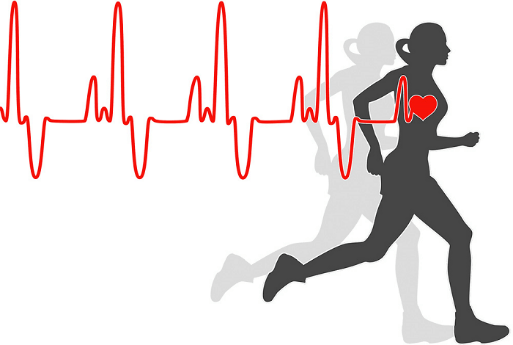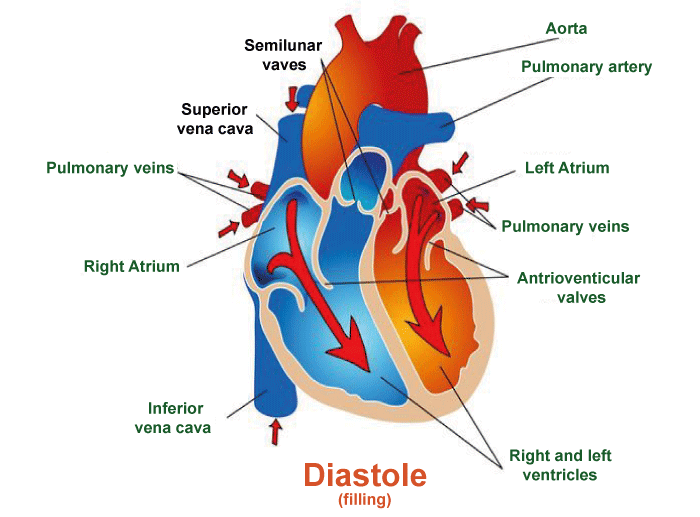Heart Rate DefinitionYour Heart beats 60 to 100 times per minute as an adult. This is known as your heart rate. By feeling your pulse, you can determine when your Heart is beating. By measuring your heart rate, you can track your health and determine whether you're exercising at the optimum intensity to benefit your health the most. 
What is Heart Rate?The number of times your Heart beats in a minute is known as your heart rate. Your body naturally modifies your heart rate to match your actions or circumstances. As a result, your heart rate rises during times of excitement, fear, or activity and falls during times of rest, tranquillity, or comfort. A key indicator of your overall well-being is your heart rate. A fast or slow heart rate may indicate a heart ailment or other health problems. By sensing your heartbeat everywhere in your body, doctors may be able to identify a medical condition. How do you Check Your Heart Rate or Pulse?By feeling your pulse, you can manually calculate your heart rate. Take these three actions.
Note whether your Heart beats with an even or irregular rhythm as well. Normal heartbeats have a consistent rhythm, similar to a clock's tick tock tick tock. Some people prefer to assess their heart rate with a heart rate monitor. Fitness trackers, now readily accessible at sporting goods stores and other stores, frequently come with these monitors. The device's quality, however, determines how accurate they are. If you just engaged in physical activity or ingested a stimulant like nicotine or caffeine, wait at least five minutes before measuring your pulse. How Frequently does your Heart Beat?Your heart rate fluctuates between 60 and 100 beats per minute without exercising. Here, we're referring to your resting heart rate. The resting heart rate of highly fit or athletic individuals may be less than 60 bpm. Your Heart beats more quickly while you exercise, so your working muscles may receive more oxygen. Your Heart will beat more quickly the more vigorously your body is working. For instance, your heart rate will be substantially higher when you are sprinting than when you are walking. It's typical for your heart rate to reach 160 beats per minute or higher while working out hard. Other substances, such as caffeine, nicotine, intoxicating substances, and some medications, may trigger your Heart to beat more quickly. When you are experiencing intense emotions like anxiety, fear, or excitement, your Heart will beat quicker. What Does "Irregular Pulse" Actually Mean?We say we have an irregular pulse when the Heart doesn't beat in a constant, regular rhythm. An irregular heartbeat or an arrhythmia are other names for this. If your heart rate is irregular, your pulse may seem inconsistent or "jump around," be racing even when you're at rest, occasionally seem abnormally slow, or even seem to pause, add, or lose a beat. Does your Heart Rate Differ from your Pulse?Your heart rate and pulse are connected yet distinct from one another. The frequency of heartbeats at any given time is called heart rate. By sensing your pulse, you can determine your heart rate. Every time your Heart beats, blood is condensed and pushed through the network of arteries in your body. Your pulse is the brief rise in blood pressure in your arteries brought on by your Heart's increased blood pumping to keep the blood flowing. As your Heart beats more slowly in between beats, the pressure drops. As a result, rather than feeling like water streaming through a hose or a continual stream of pressure, each heartbeat appears more like a single push. There are various places on your body where the arteries are relatively close to your skin, some of which are easier to feel than others due to physical characteristics. Depending on where you are, there are different places where you or a medical professional can feel your pulse easily. Your pulse is easiest to feel for you or a doctor in particular places. How Other Factors Affect Heart RateAir temperature: When the temperature (and humidity) rises, the Heart pumps more blood, which could increase pulse rate, but normally no more than 5 to 10 beats per minute. Body position: Your pulse is often the same whether sitting, standing, or sleeping. Your pulse may occasionally increase slightly as you stand for the first 15 to 20 seconds, but it should return to normal after a few minutes. Emotions: Stress, anxiety, or feeling "extraordinarily happy or sad" can all increase your heart rate. Body size: The pulse is often unaffected by body size. The resting pulse may be greater than usual if you are obese, although it normally doesn't exceed 100. Medicine use: Beta-blockers, which block your adrenaline, tend to reduce your pulse, whereas too much thyroid medicine or a high dose will increase it. What are the Various Pulse Check Techniques, and Why are they Important?Using your index and ring fingers together, lightly press the following places to feel your pulse: Neck (carotid artery): Start at your earlobe and move your finger straight down along your skin. Your pulse should be noticeable just below your jawbone. The wrist (radial artery): At this location, where your hand is held with the palm facing up, your thumb's fleshy muscle joins your wrist. Brachial artery, located inside the elbow: Using the fingers of your opposite hand, begin by placing them in the hollow centre of your elbow. Pull those fingers slowly in the direction of your body along your skin. Just slightly off-centre on the inside of your elbow, you should be able to detect your pulse. Healthcare professionals may also feel for your pulse in other places besides these arteries. Proper training might make finding these locations easier, but they are incredibly useful when an expert seeks a specific issue or problem. A few other most common places where one can feel the pulses are:
How Can I Determine My Heart Rate Using My Pulse?Once you've located your pulse (usually easiest on your wrist or neck), you can calculate your pulse rate by counting how many times your Heart beats in a minute. Just a little math is all it takes to get an answer quickly. The simplest techniques are as follows:
Your heart rate, or "beats per minute," is the number you obtain using any of the three techniques. Beats per minute are referred to as "bpm." You can measure your resting heart rate while you're not moving around. This can be done before, during, or after exercise. Finding your heart rate while exercising is important to determine whether your workout is too severe, not intense enough, or just enough. 
Should I be Able to Hear My Heartbeat in My Ears?Yes, occasionally, you can hear your pulse in your ears. This is occasionally feasible by placing your head on your arm or hand, called pulsatile tinnitus. However, if you shift positions, the sound ought to stop. Call your doctor if you can still hear your pulse after shifting positions. How Fast Should My Heart Be Beating?Your age and general health have an impact on your resting heart rate. Your heart rate tends to be higher when you're younger. For children, the following resting heart rate ranges are typical:
The typical resting heart rate range for individuals (age 18+) is 60 to 100 bpm. *These rates apply to kids that are awake. When they are sleeping, they will probably be lower. What if My Heart Rate at Rest isn't Within the Normal Range?If your resting heart rate deviates from these limits and becomes too high or low, it could be a sign of a problem. Tachycardia is characterized by an abnormally high resting heart rate of over 100 bpm. Bradycardia occurs when your resting heart rate is less than 60 bpm, which is an excessively low number. It's important to remember that if you exercise frequently, your resting heart rate may be lower than 60 bpm. Competitive athletes have been known to have resting heart rates as high as 40 bpm. However, the average person would be in grave danger at that rate. What is My Ideal and Desired Heart Rate?Your target heart rate is the heart rate range that is suitable for moderate-intensity exercise. Moderately hard exercise is advised since it is challenging enough to improve your Heart without being overly burdensome on your body. When working out vigorously, reach roughly 95% of your maximal heart rate. It would be better to use caution and avoid climbing too high. If you go too high, there may be more potential problems than benefits. If you don't regularly, you should speak with your doctor before starting an exercise routine. This is essential if you have any health difficulties, particularly those involving your Heart, breathing, or circulation. Your healthcare professional is the best person to advise on safe, effective ways to maintain your activity level without endangering your general health. Exercise and Heart RateLike any other muscle, your Heart needs exercise to keep strong and healthy. Regular exercise can reduce your risk of developing diabetes, heart disease, and other disorders. Exercise 150 minutes a week at a low to moderate level to keep your Heart healthy. If you have a cardiac condition, talk to your doctor about the forms of exercise and target heart rates that are safe for you. What should I do if My Heart Rate Worries Me?If you are worried about your heart rate, speak with your primary care physician. They are the best persons to either respond to your inquiries or, if necessary, direct you to a professional. The following are indicators that you should discuss your heart rate with your doctor: A resting heart rate that is abnormally rapid or slow regularly. An irregular or skippable heartbeat. If your pulse vibrates rather than giving you a single "thump" when you take it. This sensation is referred to as a "thrill," and it may indicate certain heart and circulation issues. If you experience heart palpitations, an uncomfortable condition in which you can feel your heartbeat but not your pulse. Additionally, you should schedule an annual physical checkup with your primary care physician at least once a year. During that visit, taking your heart rate is common practice. It also helps your doctor identify various issues early on, many of which can be treated if identified in time.
Next TopicHR Definition
|
 For Videos Join Our Youtube Channel: Join Now
For Videos Join Our Youtube Channel: Join Now
Feedback
- Send your Feedback to [email protected]
Help Others, Please Share










